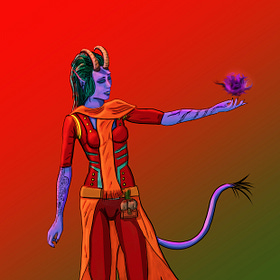The reader connection in serial fiction
I interviewed one of my veteran readers
Comics and television have enjoyed a close connection with their audiences for decades. By releasing issues and episodes one at a time on a regular schedule, creators in those mediums have been able to observe audience reaction in real time, while they’re still making the thing itself. That adds a layer of communication that can impact on the storytelling — if you allow it.
It’s not quite the same for movies and books. They are more singular, released as finished articles. There is audience interpretation, of course, but the thing itself is done. Other than sequels, there’s no further iteration, and sequels tend to be the exclusive domain of the blockbuster.
Over the last decade-and-a-half it’s been fascinating to watch movies flirt with this close exchange with the Marvel films, which exist in an episodic serial space rather than as traditional movie sequels. That creator-audience interaction reached its inevitable zenith with Deadpool & Wolverine, in which the conversation is said out loud. The Marvel franchise has occupied a peculiar place in pop culture, being both highly experimental and endlessly formulaic.

Most prose fiction has remained resolutely aloof to this kind of audience engagement. Which is fine: I’m by no means arguing that it should be the default. Masterpieces often need that isolation and the focus of a single creative mind. The endless sequels of genre fiction — crime, fantasy scifi — is the closest it gets, but even then it’s operating on a book-by-book basis, often years apart.
Then you have serial fiction especially in its modern incarnation where it’s delivered via newsletter, Wattpad, Patreon and so on. Online, in other words.
The online delivery of a long-form story in bite-sized episodes, is not only a different way of pacing, structuring and publishing writing, it also enables authors to experience that same audience connection that comics and television creators have enjoyed for well over half a century.
It’s about time.
How much you actually want to listen to the audience is an open question. In fact, it was the subject of a discussion a couple of weeks ago:
The first reader
I met Mike Miller in the early 2010s.1 We were both involved in the filmmaking and visual effects scene, making video tutorials and helping out the wider community. When I started my first online serial, A Day of Faces, in 2015, Mike came along for the ride.
He’s still reading and commenting, nearly a decade and four mega-serials later, as I continue to publish Tales from the Triverse right here on this newsletter. Mike has been an integral part of my journey as a writer. There have been many other readers, of course, and I’ve got to know some of them, but Mike was the first.
Recent developments in the Triverse story got me wondering about how much Mike has influenced my writing over the years, in subtle ways probably not intended by either of us.
For anyone unfamiliar with Tales from the Triverse, a quick summary: way back in the opening prologue, which was published in 2021, there’s a guest character called Sally. We never got to see her again, due to the 200-year time jump between the prologue and the main thrust of the story.
Over the last two years, Mike has occasionally left a comment pondering what happened to Sally. It became something of a running joke. Fast forward to mid-2024 and the Triverse story was about to hit another big narrative time jump. To create a sense of distance and change, I wanted to include some ‘filler’ chapters: explore some tangents before returning to the main characters.
I ended up doing a three-part, self-contained story all about the rest of Sally’s life:
Which made me wonder: would I have told that story, if Mike hadn’t been mentioning Sally every few months for the last couple of years? The actual story was very much my own, and I imagine went off in directions Mike never imagined — but would the spark of “let’s tell Sally’s story” have happened without his input?
The reader’s perspective
Wanting to dig into this in more detail, the obvious thing seemed to be to talk to Mike about it. It’s not often the spotlight gets turned around to shine on a reader rather than a writer, and it’s a point of view that has particular importance for anyone attempting an ongoing serial.
SKJ: Reading an online serial has a kind of risk involved. The author might never finish it, or might disappear. It’s not like a novel, where you’ve got the finished product. What makes online serials worth that investment of your own time?
MM: Here's where it gets tricky. I'm not regularly following other online serials. There are a few other Substacks I dip in and out of, but yours have been the only ones where I've been start-to-finish.
I like to read and have a huge backlog of downloaded Kindle volumes and a stack of — counts — ten printed volumes sitting in my “read me soon” stack. With an online serial it's a quick bite sized chunk to get through quickly rather than something longer which might suck me in and prevent getting enough sleep.2
SKJ: I’m increasingly obsessed about the temporal aspect of writing and reading serials. Readers of online serials are in it for the long haul. Triverse has been going for nearly 3 years now. As a reader, is it closer to the experience of watching a TV series than reading a novel?
MM: I'd say it's more in-between a comic book and a monthly magazine. TV is so visual compared to the imagination of the written word, where a comic book combines image and text, and a monthly fiction magazine is mostly text. The magazine is more likely to be short stories, but there are occasional serialized novels.
The key factor is all involve absorbing a single segment of a long narrative, separated by time gaps. All allow nice gaps for speculation, and even discussion, if one has friends following the same story.3
SKJ: Have you always enjoyed serials and longer-form storytelling? Regardless of the form - comic / TV series etc.
MM: Certainly! There's a joy in consuming a single story, whether a novel or movie in a single sitting — that of experiencing the full narrative as a whole completing that journey. There's a different joy in serialized fiction — a joy of anticipation. Are one's guesses about the future of the story correct? Will that plot point which is baffling be resolved?
SKJ: So let’s get into it. Reading an online serial often means having a direct line to the author. What does that do for the reading experience, compared to reading a novel? Is it a distraction, a fun bonus, or something else?
MM: In the case of your writing, it's fun! Not only do I enjoy breaking apart a story, I enjoy discussion with others. Here, there's an unusual opportunity to speculate and analyse at the creator of the story in real time. It's not like I'm getting to do that with J. Michael Straczynski, Neil Gaiman, Russell T. Davies, et.al.
On top of all that, you're a friend, and, as a creative myself, I know feedback helps with motivation, and self-checks.
But it's fun for me to speculate to the author where the story is going. For the author it has to be fun to see the speculation. It's also a check for you to judge if your foreshadowing, puzzles and red herrings are working as desired.
Sometimes you might get a good idea from the feedback. It might not get used, but it might spark an idea you DO use. My idea during the ‘Bombing’ plot line in Triverse that someone was trying to drive a nuke into the portal station comes to mind. Not where you took the story, but I know you added the notion to your ideas folder to think about.
Then there's Sally, but we'll come back to her…
SKJ: I’m always really careful not to descend into ‘fan service’. It’s my story, regardless of how readers are reacting. That said, there’s still a feedback loop at work. One example is the recent ‘Sally’ storyline, where I went back to the very first chapter and did a “what happened next?” standalone. It made sense structurally for that story to happen at that point, for several reasons, but I won’t lie: it may well not have happened if you hadn’t badgered me for YEARS about Sally. I’m curious about how that felt as a reader, to get that storyline that you’d talked about — half jokingly — for so long.
MM: I never really thought you'd go back to Sally. I was merely having fun occasionally bringing her up. Lo and behold, she got her own arc! I was quite chuffed to catch up with her.
On the larger issue of feedback loops, here my time as a game master and designer apply. A TTRPG is often very much an exercise in group storytelling. A GM may plan out this elaborate campaign and the players come along and do something they'd never anticipated. One has to be flexible and willing to improvise.
Storytelling in Dungeons & Dragons
I’m a bit of a collector when it comes to storytelling forms. I want to know all of the structures, all of the mediums, all of the formal languages. That's why I had to get Jon Kempton on the microphone, to discuss Dungeons & Dragons.
As a solo writer you're not improvising on the fly, but you should keep a certain amount of flexibility to incorporate something a reader brings up. The reader comment might inspire something. Dare I say, it may be a better idea than what you planned. A reader who recognizes their influence will, of course be pleased. The trick is to not compromise your own story.
That said, literature has a long tradition of easter eggs, in jokes, and audience references. Larry Niven has written many of his friends into his tales - especially his science advisors.
SKJ: Do you think there’s diminishing returns, if an author was to ‘play to the gallery’ too much? If the story just became what commenters were asking for? I’m kind of fascinated by where that line is.
MM: One shouldn't completely cater to audience whims. At some point you have to tell the story you intend on telling and trust that readers will enjoy YOUR creation. Besides, it's impossible to totally cater to audience/fan wishes. 10 different readers will have 20 opinions. Your readers, many being authors themselves, mean 10 readers will have 50 opinions. They won't agree. Cater to reader A, you'll just annoy reader B.
A ‘play to the gallery’ can absolutely work if done in a way where the wink to selected audience reads to the intended recipients, but doesn't distract everyone else.
The Sally arc in Triverse is a perfect example. Again, I was thrilled — maybe one or two other readers of the comments might have gotten that arc was partially thrown directly to me — but I think it would work for any reader because it gave more information on Sally, interesting world building, had something to say about Justin and set up the next time jump — meaning it felt like an organic part of the story, not fan service.
SKJ: An ongoing serial, especially one that is being written and published at the same time, is inevitably going to be ‘rougher’ than a finished, polished novel you buy at a bookshop. How does that trade-off work for you? Does the feeling of ‘being there’ during the act of creation make up for it being potentially less of a polished product?
MM: If your writing was crap I'd have bailed out after A Day of Faces.
In general one should understand with a weekly serial that it will be potentially ‘rougher’, but that's the trade-off.
Then again, I doubt a truly terrible author will be putting out a weekly serial.
A US soap opera used to produce 5 episodes per week, 52 weeks a year. 4 hours per week of dramatic television? Insane! Soaps used to be mocked for mediocre acting, stilted writing, and lots of padding. Yeah, 4 hours per week of content involving dozens of actors, multiple sets, and a ridiculous workload. Honestly, it's amazing how solid soaps were!
To drop back into comic books for a moment, here's another medium where the creative team has to work quickly and constantly to meet deadlines. Sometimes you get a bad arc. Hopefully, a few issues later, it will improve.
A good story is a good story, no matter the genre or medium.
SKJ: Last question. I used to write on Wattpad, now I’m on Substack. There’s a lot of work still to do on the Substack design and interface to help make fiction work better. As a fiction reader, is there anything that jumps out at you as being must-haves?
MM: Wattpad gave you a sidebar where you could append chapters as the story progressed. Made it easier to step backwards and forwards in a story if I wanted to check something. Your landing page for Triverse is a nice kludge, but Substack adding indexing/table of content tools for serial authors is the number one add.
SKJ: Thanks, Mike!
How to help new readers get on board a long-running serial
For more information on creating index pages for your Substack serials (at least until Substack implement it properly), check out this article.
Whose story is it anyway?
Short answer: it’s your story.
A story is never really owned, not once it’s gone out the door and has been published. But that initial moment of creation has to be attributed to a defined person, or set of people, in order for the story to have a point of view and meaning.
In the case of ongoing stories, the reader feedback loop will inevitably have some kind of impact, but it’s vital to hold fast to the original intent. Feedback can be a subtle nudge, or prompt new ideas, but if it becomes fan service you end up in the situation Mike describes, where you’re annoying as many people as you’re pleasing.
Unless crowdsourcing the story is an integral part of its design, but that’s a discussion for another time.
Thanks for reading.
Last Friday was the Sparkle Summit, an all-day event of workshops and panels with a whole bunch of writers. It was entirely free and you can watch the whole thing on catch-up. May I gently suggest you begin with the fiction panel, which I appeared on:
On the panel with me were Meg Oolders, the brain behind the clever Stock Fiction newsletter, and Evelyn Skye, writer of many, many books including Damsel, which became a Netflix film earlier this year. It was a proper thrill to be chatting with those two, and in the capable hands of Russell Nohelty.
Still on the Substack end of things, a recent interview with co-founder Hamish McKenzie brought a lot of the design vision into focus:
Meanwhile.
Over the weekend I played a game called Venba:
It’s about a family who move from India to Canada in the 1990s, and follows their struggle to feel at home in their new lives. It contrasts the experience of the parents with the Canadian-born child, and wraps it all up in a celebration of Tamil language, cuisine and music. It’s very clever, very short, and absolutely worth your attention.
It also won all sorts of awards, including the BAFTA for Debut Game. It’s available on everything, including as part of an IGF Excellence in Narrative bundle on Steam.
See you all later in the week.
Here’s Mike’s bio in his own words, and how it is relevant to his reading and commenting on my work:
My background strongly impacts how I consume and analyse media: From a young age I had an interest in the nuts and bolts of how film, TV, radio and writing was put together. I devoured the rare specials on TV in the 1980's covering behind the scenes, and had books on writing in my youth. In University I competed 4-year degree requirements in theater and film with 2-year degree requirements in computer imaging, English, and psychology, with side trips over to the fine arts and music departments. After university I worked with local theaters as actor, director, and multiple tech disciplines, played in a couple of bands, sold some writing (fiction and TTRPG related), wrote theater reviews for a newspaper, worked as a sound reinforcement engineer, and was a broadcast/event photo/videographer.
All of this means I have a lot of training in storytelling and a lot of practical experience in doing the same, even if the written word isn't my primary focus.
It also makes me an atypical audience member because, besides my training and experience, I'm meticulous in dissection of media I consume. I'm analytical.
I usually aim for 1,200 words per chapter, which I’ve always thought hits the sweet spot: long enough to have some real substance, but short enough to be read in a single sitting, without demanding too much time. Any longer and my chapters would start to compete for a reader’s attention, and I really don’t want to be up against movies, games, Netflix, TikTok and so on. It’s interesting to see Mike noting this as a plus point.
HOT TAKE: this is why a lot of modern streaming culture has no discernible cultural impact (and why some services are switching back to weekly episodes rather than a binge-dump).










I'm a wordy guy and Simon did heavily edit my long rambling responses - most edits are me saying nice things about Simon - but there's one additional point on serialization I wanna toss out there.
Internet gives the real time feedback, but magazines and comic books have letter's pages, and here a writer could have a delayed, but ongoing conversation with readers. Like every comic book has some reader letter discussing three issues before.
Also, many of our classics started as serials. Dickens and Dumas are only two examples of writers who serialized novels in magazines.
Dumas spent 17 years on all the D'artagnan - related (Three Musketeers, et.al) books. Almost as much time as George R. R. Martin takes to write a chapter of "The Winds of Winter!"
As someone who's released two serial novels here on the platform and is actively publishing a third, I'm heavily invested in this conversation. Having intelligent, loyal readers like Mike is invaluable on so many levels. I love the give and take of the serial release and the reader feedback is wonderful to have. Thanks for sharing this.